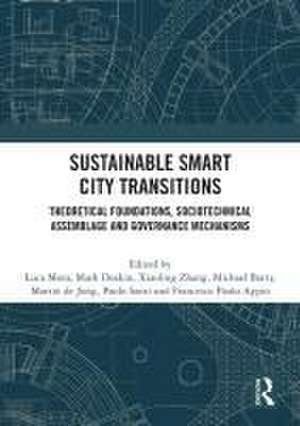Sustainable Smart City Transitions: Theoretical Foundations, Sociotechnical Assemblage and Governance Mechanisms
Editat de Luca Mora, Mark Deakin, Xiaoling Zhang, Michael Batty, Martin de Jong, Paolo Santi, Francesco Paolo Appioen Limba Engleză Paperback – 29 ian 2024
Drawing on empirical evidence stemming from existing smart city research, the book begins by advancing a theory of sustainable smart city transitions, which forms bridges between smart city development studies and some of the key assumptions underpinning transition management and system innovation research, human geography, spatial planning, and critical urban scholarship. This interdisciplinary theoretical formulation details how smart city transitions unfold and how they should be conceptualized and enacted in order to be assembled as sustainable developments. The proposed theory of sustainable smart city transitions is then enriched by the findings of investigations into the planning and implementation of smart city transition strategies and projects.
Focusing on different empirical settings, change dimensions, and analytical elements, the attention moves from the sociotechnical requirements of citywide transition pathways to the development of sector-specific smart city projects and technological innovations, in particular in the fields of urban mobility and urban governance.
This book represents a relevant reference work for academic and practitioner audiences, policy makers, and representative of smart city industries.
The chapters in this book were originally published as a special issue of the Journal of Urban Technology.
| Toate formatele și edițiile | Preț | Express |
|---|---|---|
| Paperback (1) | 389.66 lei 6-8 săpt. | |
| Taylor & Francis – 29 ian 2024 | 389.66 lei 6-8 săpt. | |
| Hardback (1) | 1008.48 lei 6-8 săpt. | |
| Taylor & Francis – 24 feb 2022 | 1008.48 lei 6-8 săpt. |
Preț: 389.66 lei
Nou
Puncte Express: 584
Preț estimativ în valută:
74.57€ • 77.41$ • 62.18£
74.57€ • 77.41$ • 62.18£
Carte tipărită la comandă
Livrare economică 24 martie-07 aprilie
Preluare comenzi: 021 569.72.76
Specificații
ISBN-13: 9781032071657
ISBN-10: 1032071656
Pagini: 322
Dimensiuni: 174 x 246 mm
Greutate: 0.45 kg
Ediția:1
Editura: Taylor & Francis
Colecția Routledge
Locul publicării:Oxford, United Kingdom
ISBN-10: 1032071656
Pagini: 322
Dimensiuni: 174 x 246 mm
Greutate: 0.45 kg
Ediția:1
Editura: Taylor & Francis
Colecția Routledge
Locul publicării:Oxford, United Kingdom
Public țintă
Postgraduate and UndergraduateNotă biografică
Luca Mora is Professor of Urban Innovation at The Business School of Edinburgh Napier University, Scotland, UK, and at the Academy of Architecture and Urban Studies of Tallinn University of Technology (TalTech), Estonia.
Mark Deakin is Professor of Built Environment at the School of Engineering and the Built Environment of Edinburgh Napier University, Scotland, UK.
Xiaoling Zhang is Professor in the Department of Public Policy of City University of Hong Kong, China.
Michael Batty is Bartlett Professor of Planning at University College London, where he chairs the Centre for Advanced Spatial Analysis (CASA).
Martin de Jong is Professor at Erasmus School of Law and Rotterdam School of Management, Erasmus University Rotterdam, The Netherlands, and a Distinguished Visiting Professor at Fudan University, Shanghai, China.
Paolo Santi is Principal Research Scientist at Senseable City Lab, Massachusetts Institute of Technology, Cambridge, MA, USA, and Research Director of the Institute of Informatics and Telematics, National Research Council, Pisa, Italy.
Francesco Paolo Appio is Associate Professor of Innovation at SKEMA Business School, France.
Mark Deakin is Professor of Built Environment at the School of Engineering and the Built Environment of Edinburgh Napier University, Scotland, UK.
Xiaoling Zhang is Professor in the Department of Public Policy of City University of Hong Kong, China.
Michael Batty is Bartlett Professor of Planning at University College London, where he chairs the Centre for Advanced Spatial Analysis (CASA).
Martin de Jong is Professor at Erasmus School of Law and Rotterdam School of Management, Erasmus University Rotterdam, The Netherlands, and a Distinguished Visiting Professor at Fudan University, Shanghai, China.
Paolo Santi is Principal Research Scientist at Senseable City Lab, Massachusetts Institute of Technology, Cambridge, MA, USA, and Research Director of the Institute of Informatics and Telematics, National Research Council, Pisa, Italy.
Francesco Paolo Appio is Associate Professor of Innovation at SKEMA Business School, France.
Cuprins
Introduction – Assembling Sustainable Smart City Transitions: An Interdisciplinary Theoretical Perspective 1. Mapping the Knowledge Domain of Smart City Development to Urban Sustainability: A Scientometric Study 2. From “Smart in the Box” to “Smart in the City”: Rethinking the Socially Sustainable Smart City in Context 3. Input- Output Modeling for Smart City Development 4. Digital Transformation of City Ecosystems: Platforms Shaping Engagement and Externalities across Vertical Markets 5. Strategic Planning for Smart City Development: Assessing Spatial Inequalities in the Basic Service Provision of Metropolitan Cities 6. How Are Smart City Concepts and Technologies Perceived and Utilized? A Systematic Geo- Twitter Analysis of Smart Cities in Australia 7. Exploring Smart City Project Implementation Risks in the Cities of Kakinada and Kanpur 8. Balancing Exploration and Exploitation in Sustainable Urban Innovation: An Ambidexterity Perspective toward Smart Cities 9. Quantifying the Spatio- Temporal Potential of Drive- by Sensing in Smart Cities 10. Understanding Ridesourcing Mobility and the Future of Electrification: A Comparative Study in Beijing 11. The Price of Privacy Control in Mobility Sharing 12. Building City Dashboards for Different Types of Users 13. Going Beyond the Smart City? Implementing Technopolitical Platforms for Urban Democracy in Madrid and Barcelona
Descriere
This book enhances the reader’s understanding of the theoretical foundations, sociotechnical assemblage, and governance mechanisms of sustainable smart city transitions.
